Lead Data Engineer Resume Examples

Jul 18, 2024
|
12 min read
Data-driven resumes: Nail your lead data engineer application with this step-by-step guide on highlighting your skills, experience, and achievements to stand out and secure that top data engineering role.
Rated by 348 people
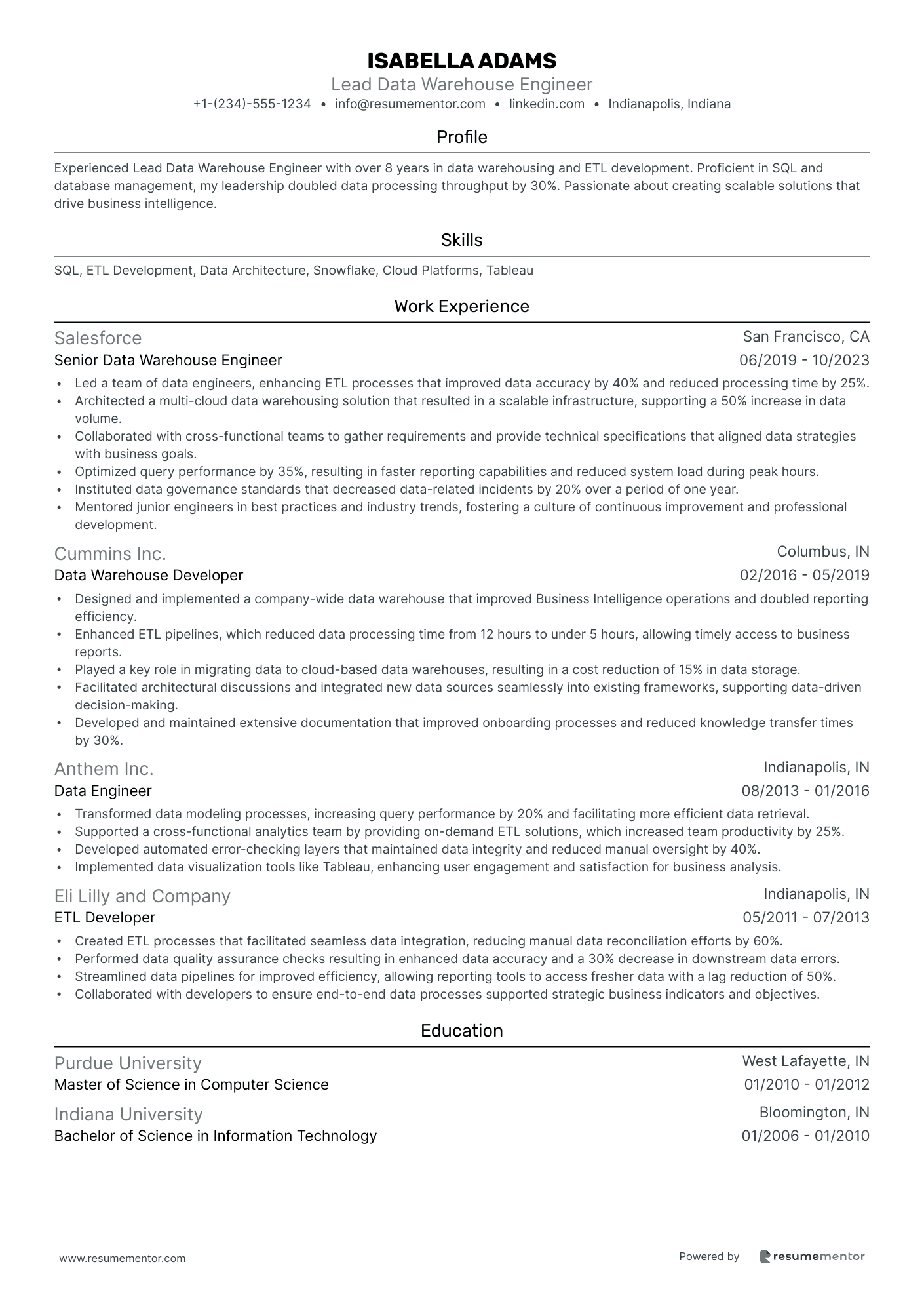
Lead Data Warehouse Engineer
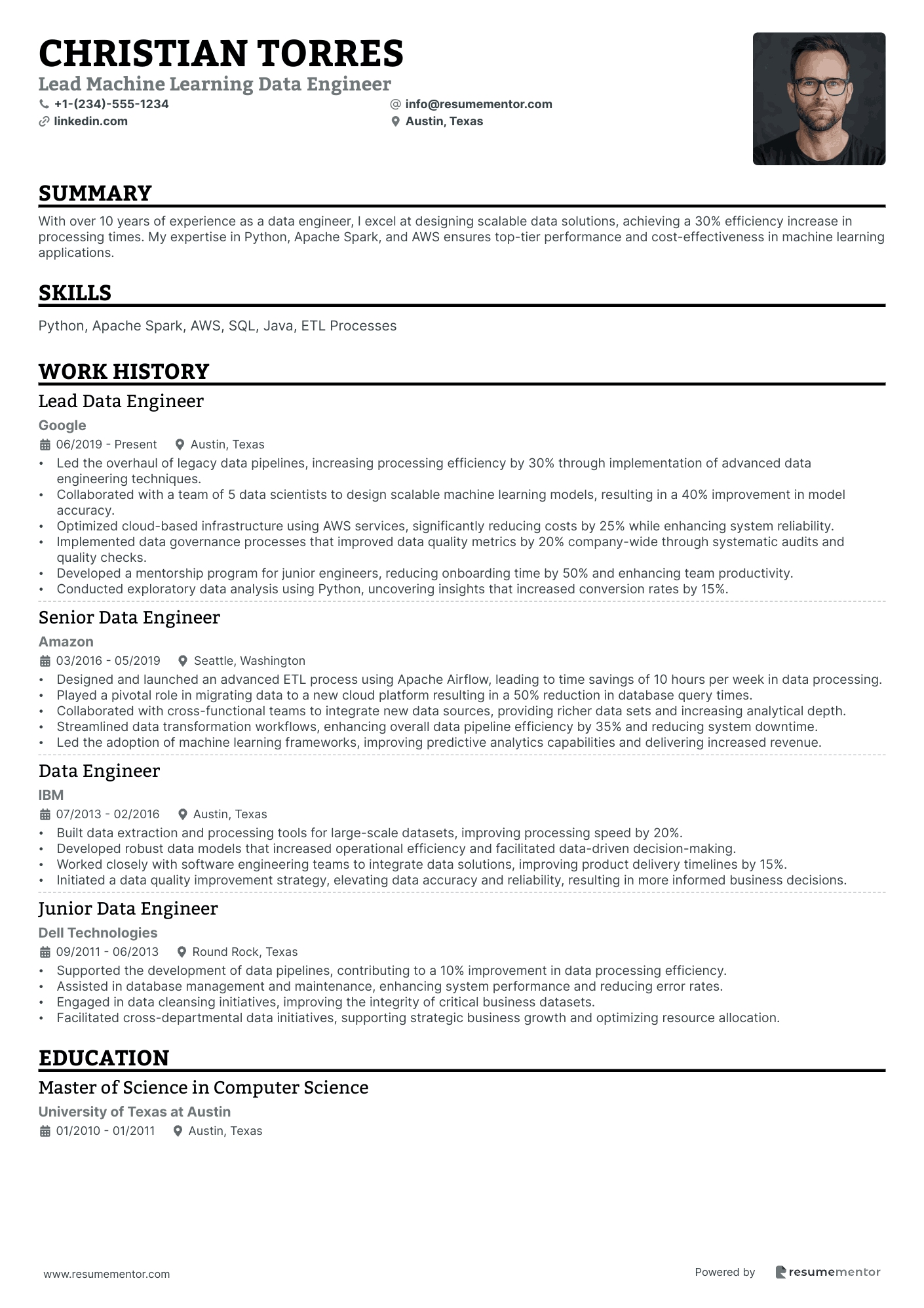
Lead Machine Learning Data Engineer
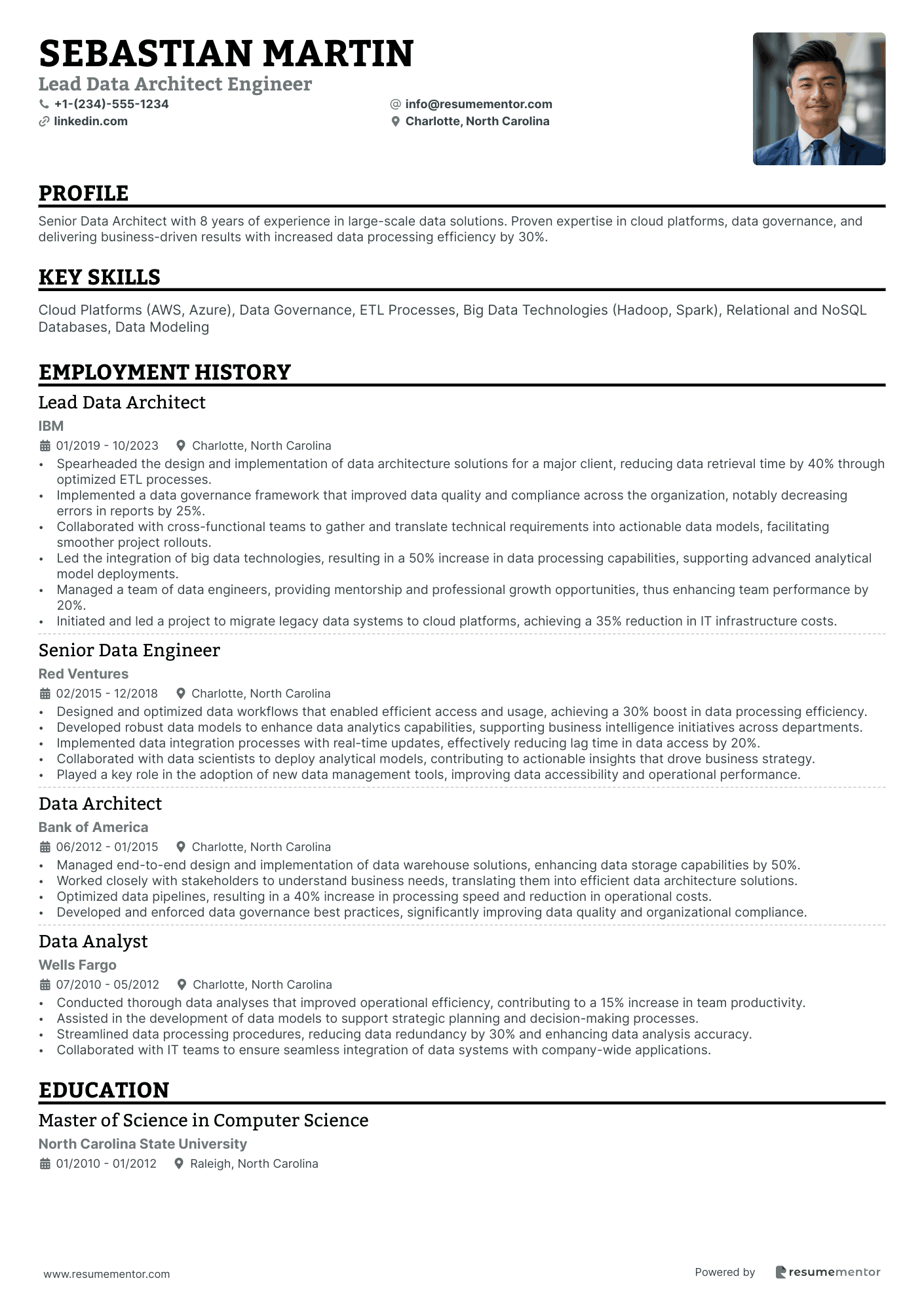
Lead Data Architect Engineer
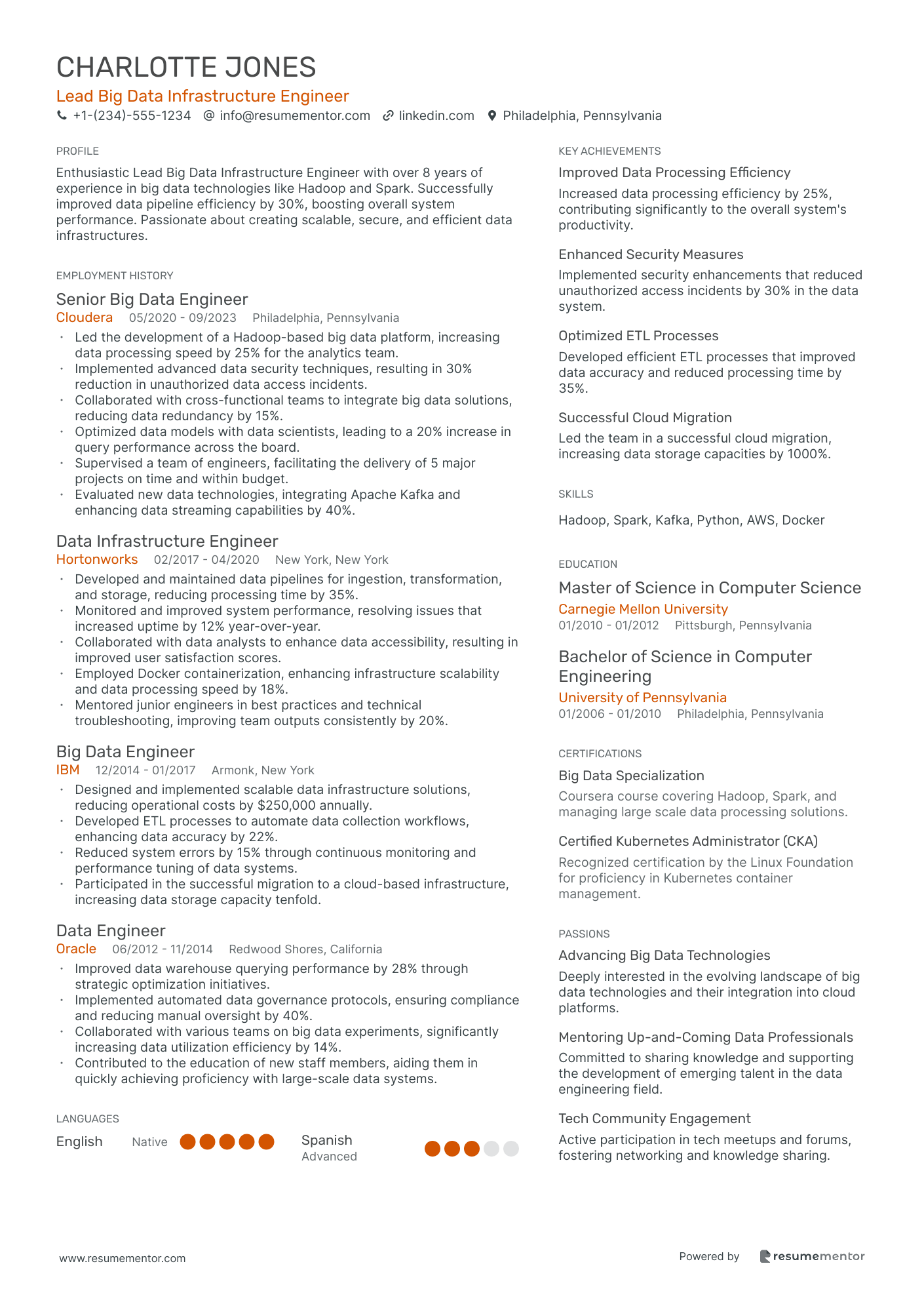
Lead Big Data Infrastructure Engineer
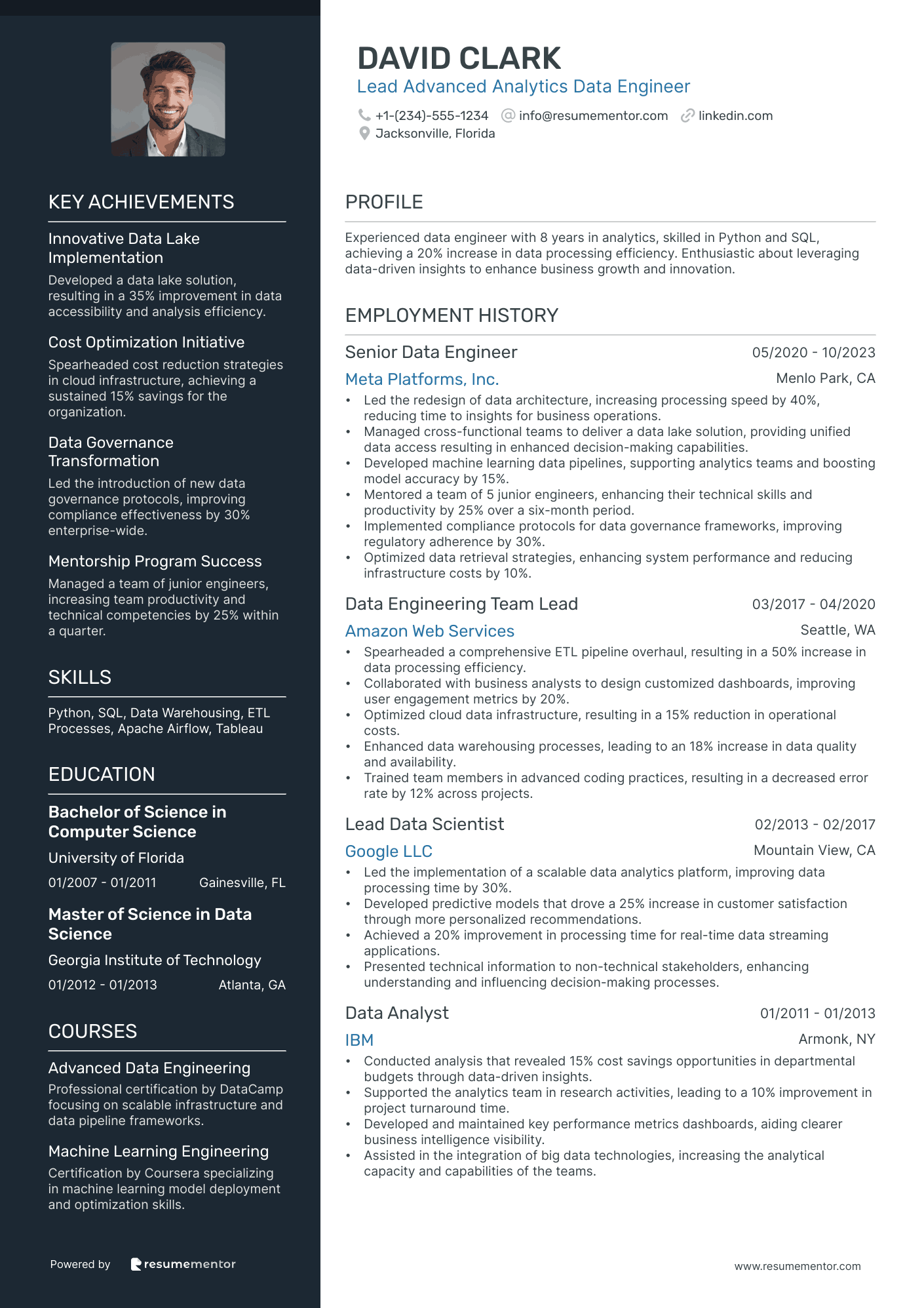
Lead Advanced Analytics Data Engineer
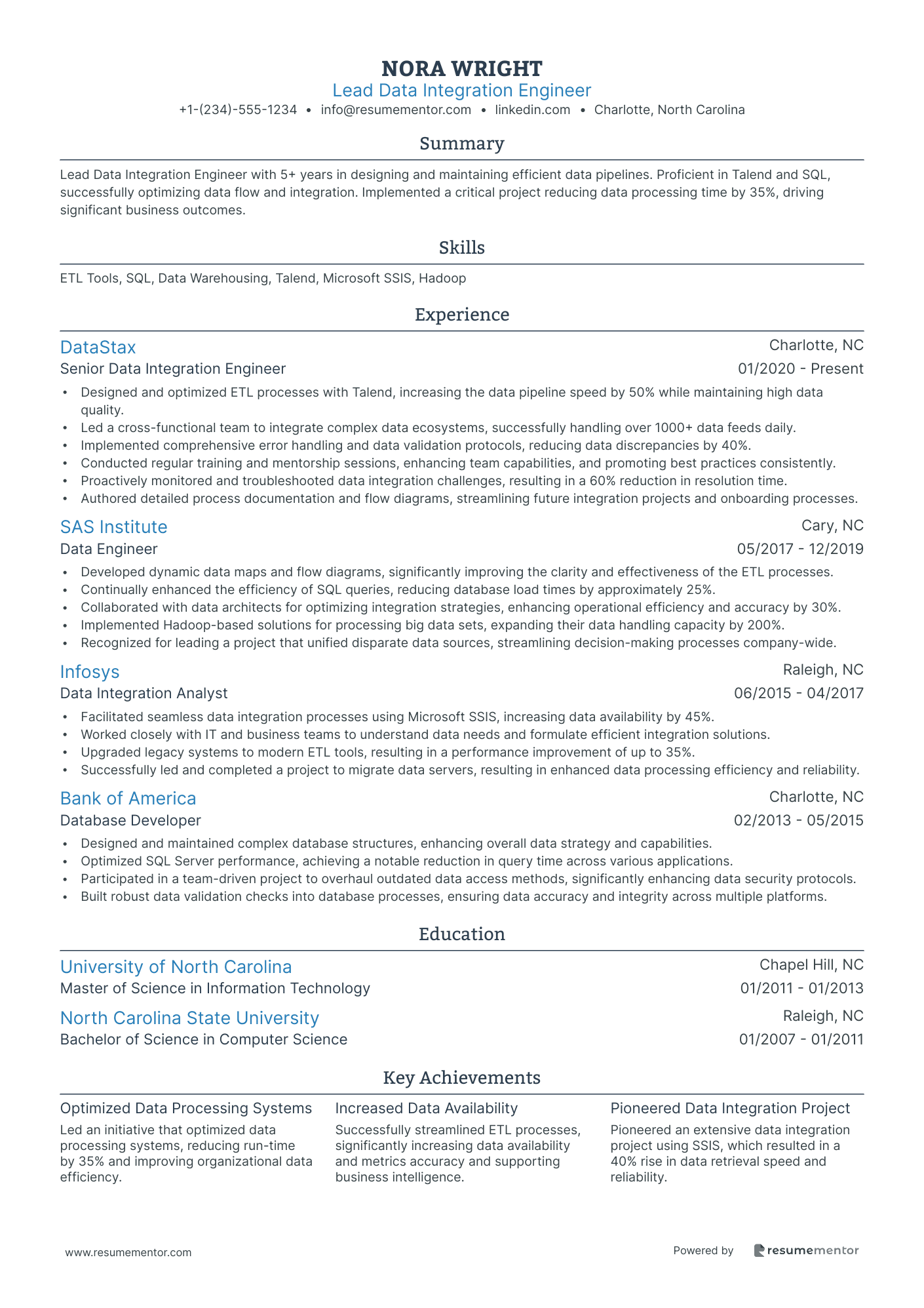
Lead Data Integration Engineer
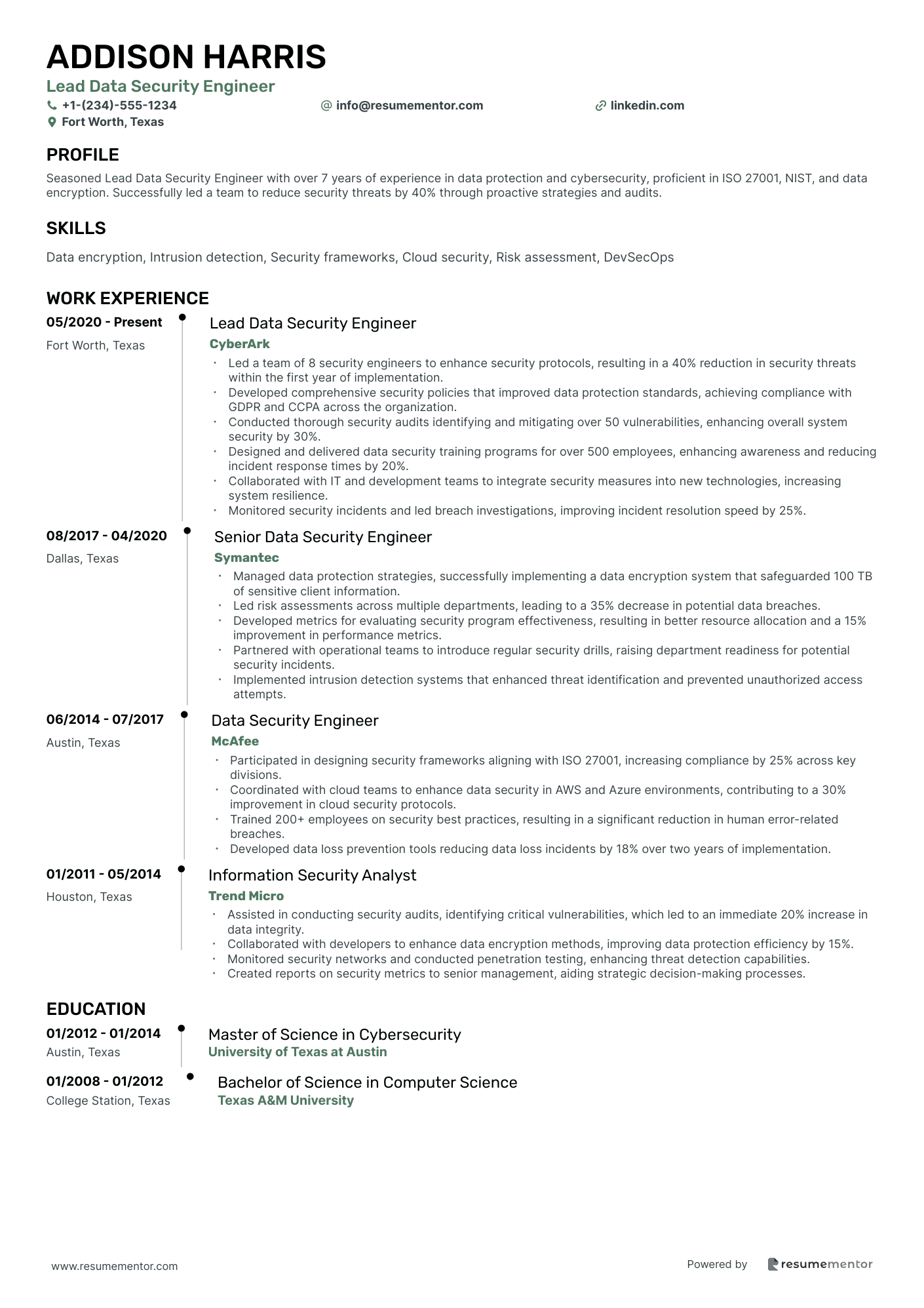
Lead Data Security Engineer
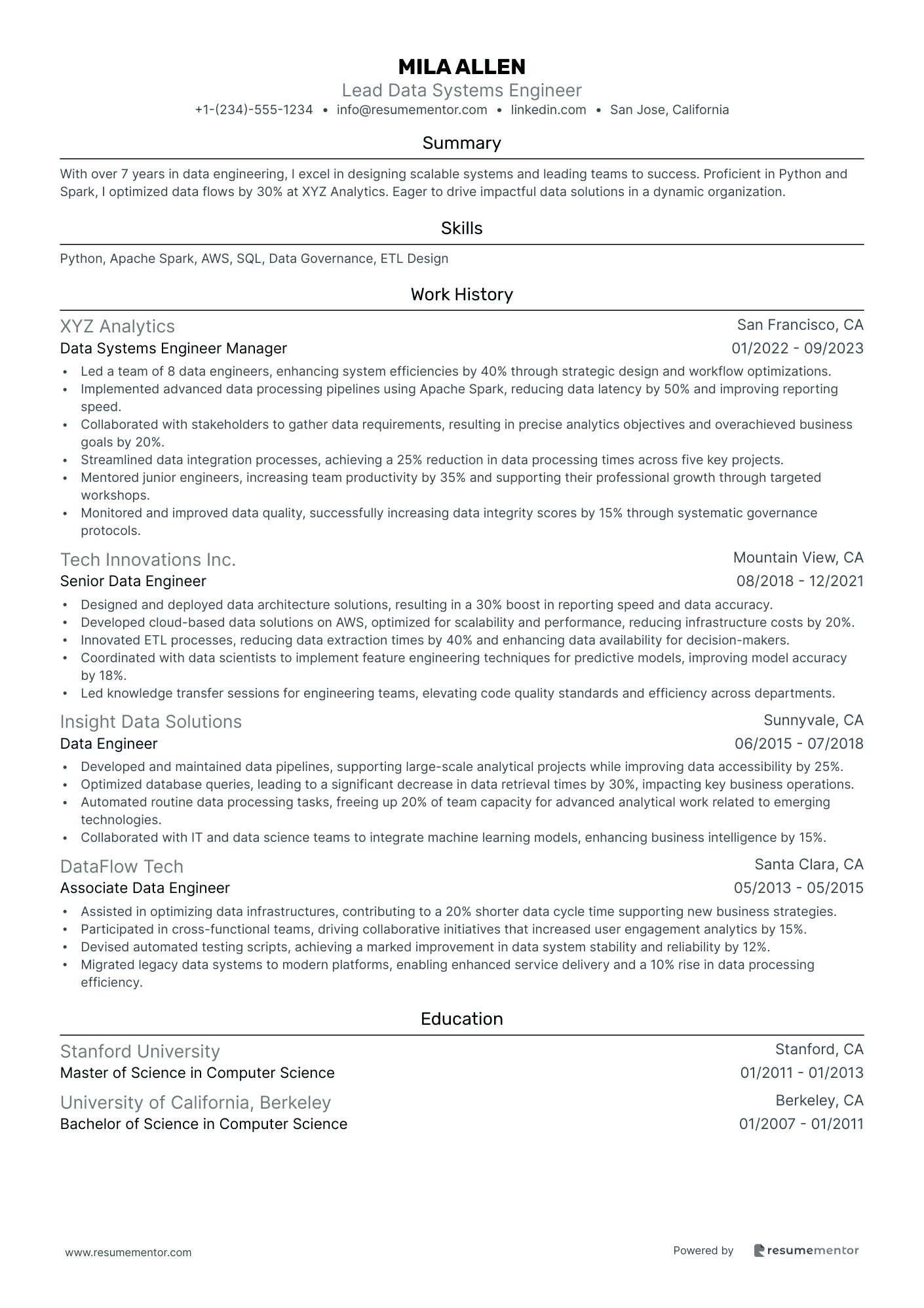
Lead Data Systems Engineer
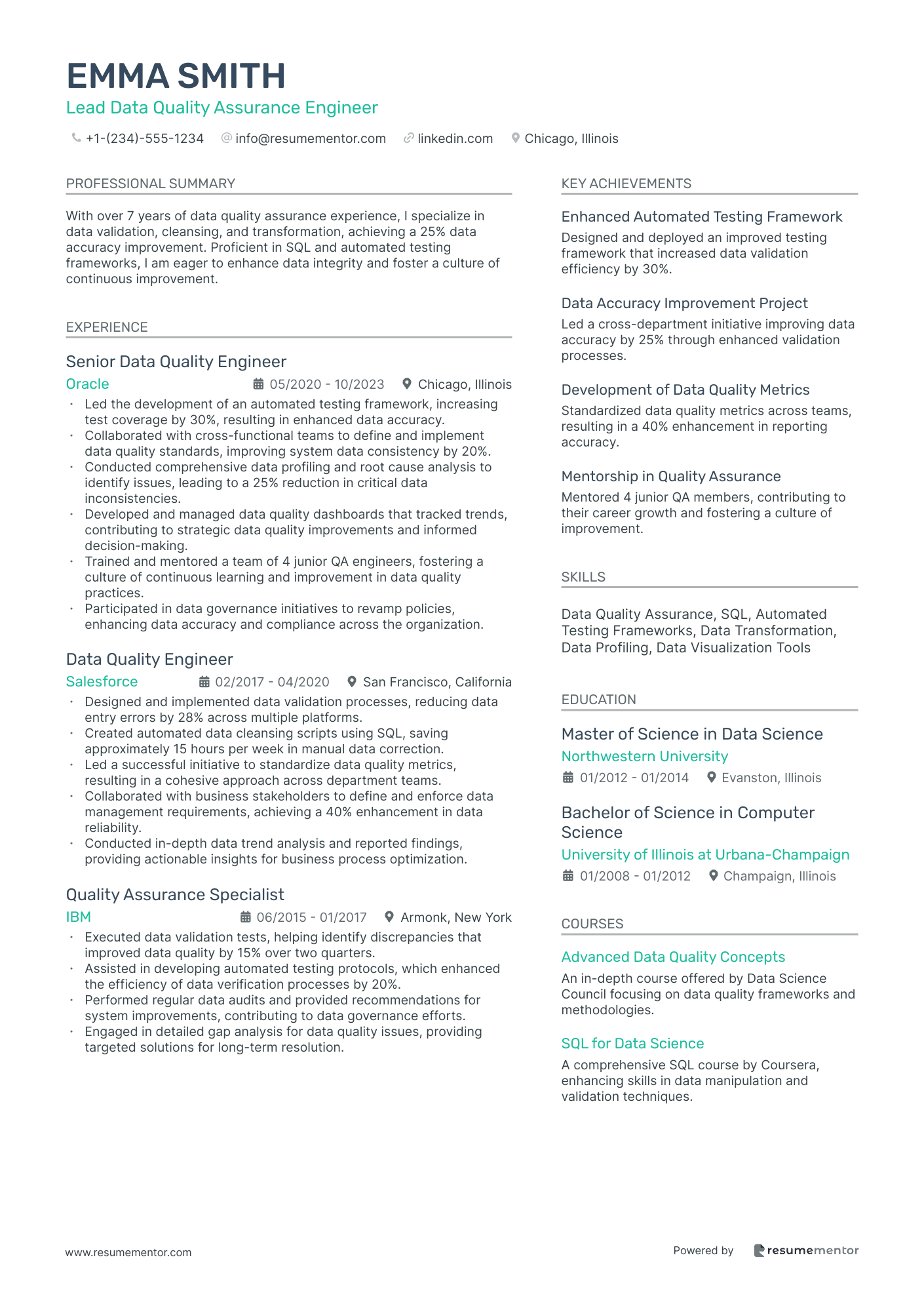
Lead Data Quality Assurance Engineer
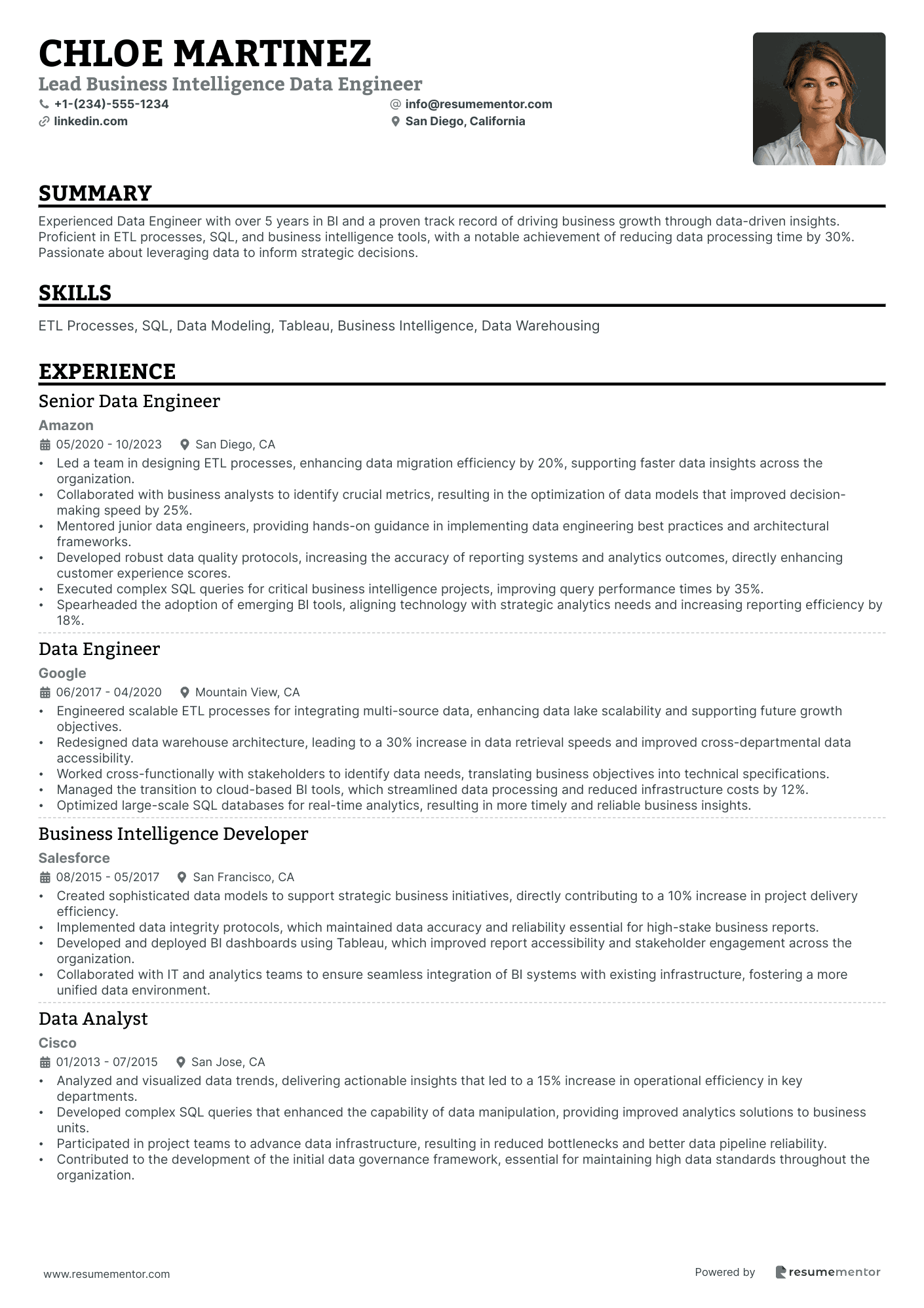
Lead Business Intelligence Data Engineer

Lead Data Warehouse Engineer resume sample
- •Led a team of data engineers, enhancing ETL processes that improved data accuracy by 40% and reduced processing time by 25%.
- •Architected a multi-cloud data warehousing solution that resulted in a scalable infrastructure, supporting a 50% increase in data volume.
- •Collaborated with cross-functional teams to gather requirements and provide technical specifications that aligned data strategies with business goals.
- •Optimized query performance by 35%, resulting in faster reporting capabilities and reduced system load during peak hours.
- •Instituted data governance standards that decreased data-related incidents by 20% over a period of one year.
- •Mentored junior engineers in best practices and industry trends, fostering a culture of continuous improvement and professional development.
- •Designed and implemented a company-wide data warehouse that improved Business Intelligence operations and doubled reporting efficiency.
- •Enhanced ETL pipelines, which reduced data processing time from 12 hours to under 5 hours, allowing timely access to business reports.
- •Played a key role in migrating data to cloud-based data warehouses, resulting in a cost reduction of 15% in data storage.
- •Facilitated architectural discussions and integrated new data sources seamlessly into existing frameworks, supporting data-driven decision-making.
- •Developed and maintained extensive documentation that improved onboarding processes and reduced knowledge transfer times by 30%.
- •Transformed data modeling processes, increasing query performance by 20% and facilitating more efficient data retrieval.
- •Supported a cross-functional analytics team by providing on-demand ETL solutions, which increased team productivity by 25%.
- •Developed automated error-checking layers that maintained data integrity and reduced manual oversight by 40%.
- •Implemented data visualization tools like Tableau, enhancing user engagement and satisfaction for business analysis.
- •Created ETL processes that facilitated seamless data integration, reducing manual data reconciliation efforts by 60%.
- •Performed data quality assurance checks resulting in enhanced data accuracy and a 30% decrease in downstream data errors.
- •Streamlined data pipelines for improved efficiency, allowing reporting tools to access fresher data with a lag reduction of 50%.
- •Collaborated with developers to ensure end-to-end data processes supported strategic business indicators and objectives.
Lead Machine Learning Data Engineer resume sample
- •Led the overhaul of legacy data pipelines, increasing processing efficiency by 30% through implementation of advanced data engineering techniques.
- •Collaborated with a team of 5 data scientists to design scalable machine learning models, resulting in a 40% improvement in model accuracy.
- •Optimized cloud-based infrastructure using AWS services, significantly reducing costs by 25% while enhancing system reliability.
- •Implemented data governance processes that improved data quality metrics by 20% company-wide through systematic audits and quality checks.
- •Developed a mentorship program for junior engineers, reducing onboarding time by 50% and enhancing team productivity.
- •Conducted exploratory data analysis using Python, uncovering insights that increased conversion rates by 15%.
- •Designed and launched an advanced ETL process using Apache Airflow, leading to time savings of 10 hours per week in data processing.
- •Played a pivotal role in migrating data to a new cloud platform resulting in a 50% reduction in database query times.
- •Collaborated with cross-functional teams to integrate new data sources, providing richer data sets and increasing analytical depth.
- •Streamlined data transformation workflows, enhancing overall data pipeline efficiency by 35% and reducing system downtime.
- •Led the adoption of machine learning frameworks, improving predictive analytics capabilities and delivering increased revenue.
- •Built data extraction and processing tools for large-scale datasets, improving processing speed by 20%.
- •Developed robust data models that increased operational efficiency and facilitated data-driven decision-making.
- •Worked closely with software engineering teams to integrate data solutions, improving product delivery timelines by 15%.
- •Initiated a data quality improvement strategy, elevating data accuracy and reliability, resulting in more informed business decisions.
- •Supported the development of data pipelines, contributing to a 10% improvement in data processing efficiency.
- •Assisted in database management and maintenance, enhancing system performance and reducing error rates.
- •Engaged in data cleansing initiatives, improving the integrity of critical business datasets.
- •Facilitated cross-departmental data initiatives, supporting strategic business growth and optimizing resource allocation.
Lead Data Architect Engineer resume sample
- •Spearheaded the design and implementation of data architecture solutions for a major client, reducing data retrieval time by 40% through optimized ETL processes.
- •Implemented a data governance framework that improved data quality and compliance across the organization, notably decreasing errors in reports by 25%.
- •Collaborated with cross-functional teams to gather and translate technical requirements into actionable data models, facilitating smoother project rollouts.
- •Led the integration of big data technologies, resulting in a 50% increase in data processing capabilities, supporting advanced analytical model deployments.
- •Managed a team of data engineers, providing mentorship and professional growth opportunities, thus enhancing team performance by 20%.
- •Initiated and led a project to migrate legacy data systems to cloud platforms, achieving a 35% reduction in IT infrastructure costs.
- •Designed and optimized data workflows that enabled efficient access and usage, achieving a 30% boost in data processing efficiency.
- •Developed robust data models to enhance data analytics capabilities, supporting business intelligence initiatives across departments.
- •Implemented data integration processes with real-time updates, effectively reducing lag time in data access by 20%.
- •Collaborated with data scientists to deploy analytical models, contributing to actionable insights that drove business strategy.
- •Played a key role in the adoption of new data management tools, improving data accessibility and operational performance.
- •Managed end-to-end design and implementation of data warehouse solutions, enhancing data storage capabilities by 50%.
- •Worked closely with stakeholders to understand business needs, translating them into efficient data architecture solutions.
- •Optimized data pipelines, resulting in a 40% increase in processing speed and reduction in operational costs.
- •Developed and enforced data governance best practices, significantly improving data quality and organizational compliance.
- •Conducted thorough data analyses that improved operational efficiency, contributing to a 15% increase in team productivity.
- •Assisted in the development of data models to support strategic planning and decision-making processes.
- •Streamlined data processing procedures, reducing data redundancy by 30% and enhancing data analysis accuracy.
- •Collaborated with IT teams to ensure seamless integration of data systems with company-wide applications.
Lead Big Data Infrastructure Engineer resume sample
- •Led the development of a Hadoop-based big data platform, increasing data processing speed by 25% for the analytics team.
- •Implemented advanced data security techniques, resulting in 30% reduction in unauthorized data access incidents.
- •Collaborated with cross-functional teams to integrate big data solutions, reducing data redundancy by 15%.
- •Optimized data models with data scientists, leading to a 20% increase in query performance across the board.
- •Supervised a team of engineers, facilitating the delivery of 5 major projects on time and within budget.
- •Evaluated new data technologies, integrating Apache Kafka and enhancing data streaming capabilities by 40%.
- •Developed and maintained data pipelines for ingestion, transformation, and storage, reducing processing time by 35%.
- •Monitored and improved system performance, resolving issues that increased uptime by 12% year-over-year.
- •Collaborated with data analysts to enhance data accessibility, resulting in improved user satisfaction scores.
- •Employed Docker containerization, enhancing infrastructure scalability and data processing speed by 18%.
- •Mentored junior engineers in best practices and technical troubleshooting, improving team outputs consistently by 20%.
- •Designed and implemented scalable data infrastructure solutions, reducing operational costs by $250,000 annually.
- •Developed ETL processes to automate data collection workflows, enhancing data accuracy by 22%.
- •Reduced system errors by 15% through continuous monitoring and performance tuning of data systems.
- •Participated in the successful migration to a cloud-based infrastructure, increasing data storage capacity tenfold.
- •Improved data warehouse querying performance by 28% through strategic optimization initiatives.
- •Implemented automated data governance protocols, ensuring compliance and reducing manual oversight by 40%.
- •Collaborated with various teams on big data experiments, significantly increasing data utilization efficiency by 14%.
- •Contributed to the education of new staff members, aiding them in quickly achieving proficiency with large-scale data systems.
Lead Advanced Analytics Data Engineer resume sample
- •Led the redesign of data architecture, increasing processing speed by 40%, reducing time to insights for business operations.
- •Managed cross-functional teams to deliver a data lake solution, providing unified data access resulting in enhanced decision-making capabilities.
- •Developed machine learning data pipelines, supporting analytics teams and boosting model accuracy by 15%.
- •Mentored a team of 5 junior engineers, enhancing their technical skills and productivity by 25% over a six-month period.
- •Implemented compliance protocols for data governance frameworks, improving regulatory adherence by 30%.
- •Optimized data retrieval strategies, enhancing system performance and reducing infrastructure costs by 10%.
- •Spearheaded a comprehensive ETL pipeline overhaul, resulting in a 50% increase in data processing efficiency.
- •Collaborated with business analysts to design customized dashboards, improving user engagement metrics by 20%.
- •Optimized cloud data infrastructure, resulting in a 15% reduction in operational costs.
- •Enhanced data warehousing processes, leading to an 18% increase in data quality and availability.
- •Trained team members in advanced coding practices, resulting in a decreased error rate by 12% across projects.
- •Led the implementation of a scalable data analytics platform, improving data processing time by 30%.
- •Developed predictive models that drove a 25% increase in customer satisfaction through more personalized recommendations.
- •Achieved a 20% improvement in processing time for real-time data streaming applications.
- •Presented technical information to non-technical stakeholders, enhancing understanding and influencing decision-making processes.
- •Conducted analysis that revealed 15% cost savings opportunities in departmental budgets through data-driven insights.
- •Supported the analytics team in research activities, leading to a 10% improvement in project turnaround time.
- •Developed and maintained key performance metrics dashboards, aiding clearer business intelligence visibility.
- •Assisted in the integration of big data technologies, increasing the analytical capacity and capabilities of the teams.
Lead Data Integration Engineer resume sample
- •Designed and optimized ETL processes with Talend, increasing the data pipeline speed by 50% while maintaining high data quality.
- •Led a cross-functional team to integrate complex data ecosystems, successfully handling over 1000+ data feeds daily.
- •Implemented comprehensive error handling and data validation protocols, reducing data discrepancies by 40%.
- •Conducted regular training and mentorship sessions, enhancing team capabilities, and promoting best practices consistently.
- •Proactively monitored and troubleshooted data integration challenges, resulting in a 60% reduction in resolution time.
- •Authored detailed process documentation and flow diagrams, streamlining future integration projects and onboarding processes.
- •Developed dynamic data maps and flow diagrams, significantly improving the clarity and effectiveness of the ETL processes.
- •Continually enhanced the efficiency of SQL queries, reducing database load times by approximately 25%.
- •Collaborated with data architects for optimizing integration strategies, enhancing operational efficiency and accuracy by 30%.
- •Implemented Hadoop-based solutions for processing big data sets, expanding their data handling capacity by 200%.
- •Recognized for leading a project that unified disparate data sources, streamlining decision-making processes company-wide.
- •Facilitated seamless data integration processes using Microsoft SSIS, increasing data availability by 45%.
- •Worked closely with IT and business teams to understand data needs and formulate efficient integration solutions.
- •Upgraded legacy systems to modern ETL tools, resulting in a performance improvement of up to 35%.
- •Successfully led and completed a project to migrate data servers, resulting in enhanced data processing efficiency and reliability.
- •Designed and maintained complex database structures, enhancing overall data strategy and capabilities.
- •Optimized SQL Server performance, achieving a notable reduction in query time across various applications.
- •Participated in a team-driven project to overhaul outdated data access methods, significantly enhancing data security protocols.
- •Built robust data validation checks into database processes, ensuring data accuracy and integrity across multiple platforms.
Lead Data Security Engineer resume sample
- •Led a team of 8 security engineers to enhance security protocols, resulting in a 40% reduction in security threats within the first year of implementation.
- •Developed comprehensive security policies that improved data protection standards, achieving compliance with GDPR and CCPA across the organization.
- •Conducted thorough security audits identifying and mitigating over 50 vulnerabilities, enhancing overall system security by 30%.
- •Designed and delivered data security training programs for over 500 employees, enhancing awareness and reducing incident response times by 20%.
- •Collaborated with IT and development teams to integrate security measures into new technologies, increasing system resilience.
- •Monitored security incidents and led breach investigations, improving incident resolution speed by 25%.
- •Managed data protection strategies, successfully implementing a data encryption system that safeguarded 100 TB of sensitive client information.
- •Led risk assessments across multiple departments, leading to a 35% decrease in potential data breaches.
- •Developed metrics for evaluating security program effectiveness, resulting in better resource allocation and a 15% improvement in performance metrics.
- •Partnered with operational teams to introduce regular security drills, raising department readiness for potential security incidents.
- •Implemented intrusion detection systems that enhanced threat identification and prevented unauthorized access attempts.
- •Participated in designing security frameworks aligning with ISO 27001, increasing compliance by 25% across key divisions.
- •Coordinated with cloud teams to enhance data security in AWS and Azure environments, contributing to a 30% improvement in cloud security protocols.
- •Trained 200+ employees on security best practices, resulting in a significant reduction in human error-related breaches.
- •Developed data loss prevention tools reducing data loss incidents by 18% over two years of implementation.
- •Assisted in conducting security audits, identifying critical vulnerabilities, which led to an immediate 20% increase in data integrity.
- •Collaborated with developers to enhance data encryption methods, improving data protection efficiency by 15%.
- •Monitored security networks and conducted penetration testing, enhancing threat detection capabilities.
- •Created reports on security metrics to senior management, aiding strategic decision-making processes.
Lead Data Systems Engineer resume sample
- •Led a team of 8 data engineers, enhancing system efficiencies by 40% through strategic design and workflow optimizations.
- •Implemented advanced data processing pipelines using Apache Spark, reducing data latency by 50% and improving reporting speed.
- •Collaborated with stakeholders to gather data requirements, resulting in precise analytics objectives and overachieved business goals by 20%.
- •Streamlined data integration processes, achieving a 25% reduction in data processing times across five key projects.
- •Mentored junior engineers, increasing team productivity by 35% and supporting their professional growth through targeted workshops.
- •Monitored and improved data quality, successfully increasing data integrity scores by 15% through systematic governance protocols.
- •Designed and deployed data architecture solutions, resulting in a 30% boost in reporting speed and data accuracy.
- •Developed cloud-based data solutions on AWS, optimized for scalability and performance, reducing infrastructure costs by 20%.
- •Innovated ETL processes, reducing data extraction times by 40% and enhancing data availability for decision-makers.
- •Coordinated with data scientists to implement feature engineering techniques for predictive models, improving model accuracy by 18%.
- •Led knowledge transfer sessions for engineering teams, elevating code quality standards and efficiency across departments.
- •Developed and maintained data pipelines, supporting large-scale analytical projects while improving data accessibility by 25%.
- •Optimized database queries, leading to a significant decrease in data retrieval times by 30%, impacting key business operations.
- •Automated routine data processing tasks, freeing up 20% of team capacity for advanced analytical work related to emerging technologies.
- •Collaborated with IT and data science teams to integrate machine learning models, enhancing business intelligence by 15%.
- •Assisted in optimizing data infrastructures, contributing to a 20% shorter data cycle time supporting new business strategies.
- •Participated in cross-functional teams, driving collaborative initiatives that increased user engagement analytics by 15%.
- •Devised automated testing scripts, achieving a marked improvement in data system stability and reliability by 12%.
- •Migrated legacy data systems to modern platforms, enabling enhanced service delivery and a 10% rise in data processing efficiency.
Lead Data Quality Assurance Engineer resume sample
- •Led the development of an automated testing framework, increasing test coverage by 30%, resulting in enhanced data accuracy.
- •Collaborated with cross-functional teams to define and implement data quality standards, improving system data consistency by 20%.
- •Conducted comprehensive data profiling and root cause analysis to identify issues, leading to a 25% reduction in critical data inconsistencies.
- •Developed and managed data quality dashboards that tracked trends, contributing to strategic data quality improvements and informed decision-making.
- •Trained and mentored a team of 4 junior QA engineers, fostering a culture of continuous learning and improvement in data quality practices.
- •Participated in data governance initiatives to revamp policies, enhancing data accuracy and compliance across the organization.
- •Designed and implemented data validation processes, reducing data entry errors by 28% across multiple platforms.
- •Created automated data cleansing scripts using SQL, saving approximately 15 hours per week in manual data correction.
- •Led a successful initiative to standardize data quality metrics, resulting in a cohesive approach across department teams.
- •Collaborated with business stakeholders to define and enforce data management requirements, achieving a 40% enhancement in data reliability.
- •Conducted in-depth data trend analysis and reported findings, providing actionable insights for business process optimization.
- •Executed data validation tests, helping identify discrepancies that improved data quality by 15% over two quarters.
- •Assisted in developing automated testing protocols, which enhanced the efficiency of data verification processes by 20%.
- •Performed regular data audits and provided recommendations for system improvements, contributing to data governance efforts.
- •Engaged in detailed gap analysis for data quality issues, providing targeted solutions for long-term resolution.
- •Contributed to significant data cleansing projects, improving data accuracy by 12% within key databases.
- •Collaborated closely with engineers to streamline data transformation processes, enhancing data integrity across systems.
- •Supported various cross-functional teams by delivering precise data analyses, aiding in informed decision-making.
Lead Business Intelligence Data Engineer resume sample
- •Led a team in designing ETL processes, enhancing data migration efficiency by 20%, supporting faster data insights across the organization.
- •Collaborated with business analysts to identify crucial metrics, resulting in the optimization of data models that improved decision-making speed by 25%.
- •Mentored junior data engineers, providing hands-on guidance in implementing data engineering best practices and architectural frameworks.
- •Developed robust data quality protocols, increasing the accuracy of reporting systems and analytics outcomes, directly enhancing customer experience scores.
- •Executed complex SQL queries for critical business intelligence projects, improving query performance times by 35%.
- •Spearheaded the adoption of emerging BI tools, aligning technology with strategic analytics needs and increasing reporting efficiency by 18%.
- •Engineered scalable ETL processes for integrating multi-source data, enhancing data lake scalability and supporting future growth objectives.
- •Redesigned data warehouse architecture, leading to a 30% increase in data retrieval speeds and improved cross-departmental data accessibility.
- •Worked cross-functionally with stakeholders to identify data needs, translating business objectives into technical specifications.
- •Managed the transition to cloud-based BI tools, which streamlined data processing and reduced infrastructure costs by 12%.
- •Optimized large-scale SQL databases for real-time analytics, resulting in more timely and reliable business insights.
- •Created sophisticated data models to support strategic business initiatives, directly contributing to a 10% increase in project delivery efficiency.
- •Implemented data integrity protocols, which maintained data accuracy and reliability essential for high-stake business reports.
- •Developed and deployed BI dashboards using Tableau, which improved report accessibility and stakeholder engagement across the organization.
- •Collaborated with IT and analytics teams to ensure seamless integration of BI systems with existing infrastructure, fostering a more unified data environment.
- •Analyzed and visualized data trends, delivering actionable insights that led to a 15% increase in operational efficiency in key departments.
- •Developed complex SQL queries that enhanced the capability of data manipulation, providing improved analytics solutions to business units.
- •Participated in project teams to advance data infrastructure, resulting in reduced bottlenecks and better data pipeline reliability.
- •Contributed to the development of the initial data governance framework, essential for maintaining high data standards throughout the organization.
As a lead data engineer, your resume acts as your blueprint, giving potential employers a clear view of your skills in complex data architecture. Crafting a resume in this field can feel like assembling a puzzle. You need to capture years of technical expertise in just a few impactful bullet points, while also ensuring readability.
Your resume should seamlessly present both your technical prowess and leadership abilities. It's not just about listing past achievements; it's about illustrating your capacity to lead teams and drive projects forward. Using a resume template can greatly aid in this endeavor. With structured formats, you guarantee that no crucial detail slips through the cracks, allowing you to better focus on content.
Organizing your resume to focus on relevant projects and technologies is key. By highlighting your experience in handling large data sets or boosting system efficiencies, you provide a vivid picture of your value to potential employers.
When it comes to structuring your thoughts, clarity is paramount. Hiring managers often spend just seconds on each resume, so making your strongest points immediately clear is essential. A well-organized resume can effectively map your career journey, illustrating your growth from engineer to leader in a way that captures attention.
By following these guidelines and utilizing a well-chosen template, you can transform the complexity of your role into an engaging, readable resume. This approach will set you on the path to landing that ideal lead position.
Key Takeaways
- Crafting a resume for a lead data engineer should effectively blend technical expertise and leadership skills, with a focus on showcasing the ability to manage data teams and projects using modern technologies.
- Organizing the resume to immediately highlight strong points and relevant experiences is crucial, as hiring managers spend only seconds evaluating each document.
- Utilizing a reverse-chronological format and modern fonts is recommended to clearly outline career progression and maintain professionalism throughout the resume.
- The experience section should focus on presenting quantifiable achievements that demonstrate the impact and improvements driven by the candidate.
- Including sections for education, certifications, and additional personal interests provides a holistic view of one's capabilities, enhancing the appeal of the resume to potential employers.
What to focus on when writing your lead data engineer resume
Your lead data engineer resume should convey a blend of your technical expertise, leadership skills, and drive in navigating data initiatives. The document should seamlessly highlight your ability to manage both data teams and cutting-edge projects while showcasing your adeptness with modern data technologies.
How to structure your lead data engineer resume
- Contact Information: Start by including your full name, phone number, and professional email address—these details are crucial for straightforward communication. Adding your LinkedIn profile URL provides a quick view into your professional network and recommendations, making it easier for recruiters to connect your online presence with your resume and see a fuller picture of your professional life.
- Professional Summary: Introduce yourself with a brief overview of your experience as a lead data engineer—this is your elevator pitch. Emphasize how your leadership roles and successful data solutions have positively impacted company goals, providing a snapshot of your strengths at a glance. This summary sets the stage for the detailed experiences that will follow, highlighting the key achievements and qualities that align with the role you’re pursuing.
- Technical Skills: Make sure to underline relevant skills such as proficiency in Python, SQL, and cloud platforms like AWS or Azure—these are essential tools in your field. By including big data tools like Hadoop or Spark, you underscore your readiness to handle advanced data challenges, supporting the claims in your professional summary. This section is crucial for ATS and ensures you match the job requirements with technical know-how.
- Professional Experience: Move on to detailing your career, starting with your most recent roles—this section is the backbone of your resume, showcasing your journey. Specify titles, companies, and dates, and weave in action-oriented descriptions of achievements that demonstrate your leadership in data engineering projects. These examples provide concrete evidence of what you summarized earlier and highlight your ability to deliver results effectively.
- Education: Follow with your educational background, focusing on your highest degree in fields like computer science or data science—this lays out the groundwork of your expertise. Connecting this with your technical skills reinforces the foundation you've built for your professional journey, showing a clear path from formal education to practical application in the industry.
- Certifications and Training: Round out your expertise with certifications like AWS Certified Big Data or Google Professional Data Engineer—these certifications validate your proficiency in specialized areas. Mentioning workshops or bootcamps that have sharpened your skills shows a commitment to continuous learning, directly tying back to your professional growth. Preparing an organized resume format is crucial for ensuring each section is effectively presented, and below we'll cover each section more in-depth.
Which resume format to choose
Creating your resume as a lead data engineer involves making informed choices that effectively highlight your specialized skills and experience. Start with a reverse-chronological format, which is ideal for showcasing a clear career progression. This format helps employers quickly see your growth and recent accomplishments in data engineering, adding credibility to your expertise.
When choosing fonts, opt for modern options like Raleway, Montserrat, or Lato. These fonts provide a sleek and contemporary look that sets your resume apart from more traditional ones. While the font style may not seem crucial, it subtly influences how your resume is perceived, reinforcing your attention to detail—a valuable trait in a data engineer.
Saving your resume as a PDF is essential to maintaining its format across various devices and operating systems. This ensures that all your content—including complex project descriptions and technical skills—remains intact and easy to read.
Lastly, setting margins to one inch on all sides helps create a balanced and organized layout. This not only enhances readability but also conveys professionalism. A well-structured resume with consistent formatting reflects your ability to present data in a clear and logical manner, a key skill for any lead data engineer.
How to write a quantifiable resume experience section
The experience section of your lead data engineer resume should seamlessly combine your technical skills, leadership qualities, and project achievements, effectively demonstrating how you've used your expertise to drive results. Start by organizing your roles in reverse chronological order, ensuring your most recent experience takes top priority. Include roles from the past 10-15 years that are most relevant to the position you're applying for.
Tailoring your resume is key to making a strong impression. By aligning your experiences with the job description, you emphasize the skills and achievements that fit best with what the employer is seeking. Strong action words such as “achieved,” “designed,” “led,” and “improved” can clearly convey the impact you've made. Zero in on quantifiable outcomes, highlighting how your contributions have boosted efficiency, driven revenue growth, or enhanced processes. For each role, provide a concise overview and enrich it with bullet points focused on your standout accomplishments.
Here's a refined example of an effective experience section:
- •Implemented a data pipeline that boosted processing efficiency by 35%, cutting operational costs by 20%.
- •Led a team of 5 engineers to create a scalable cloud-based data architecture, accommodating a 50% increase in data volume over 2 years.
- •Collaborated with cross-functional teams to launch a real-time analytics platform, improving decision-making speed by 40%.
- •Reduced data retrieval times by 25% through optimized indexing and better query performance.
This experience section stands out by seamlessly integrating the responsibilities and accomplishments that define a lead data engineer. Each bullet point connects with the role by illustrating quantifiable achievements, such as boosting processing efficiency by 35% and supporting a 50% increase in data volume, which confirms your capacity to drive substantial organizational improvements. Action verbs like "implemented," "led," and "collaborated" create a cohesive narrative that reflects a proactive and results-driven approach. Leadership qualities and teamwork are also woven into the description, presenting a comprehensive portrait of your professional impact and expertise.
Industry-Specific Focus resume experience section
A finance-focused lead data engineer resume experience section should clearly showcase how your work has positively impacted both data processes and organizational goals. Begin by detailing your role and the timeframe for clarity. Use bullet points that connect directly to your achievements and the resulting benefits, focusing on quantifiable metrics that highlight the value you’ve added. This structured approach allows potential employers to quickly understand the scope of your contributions.
Emphasize how your leadership in data engineering has resulted in measurable improvements, such as streamlined workflows or enhanced data security, especially within industry-specific contexts like finance. Integrate specific examples of collaboration with other teams to demonstrate your ability to work cross-functionally and tailor solutions to unique industry needs. Use industry terms thoughtfully to illustrate your expertise without overwhelming the reader. This connection-driven narrative helps employers see how your skills will benefit their team.
Lead Data Engineer
Financial Solutions Co.
January 2020 - Present
- Led a team of data engineers to design a scalable data architecture that reduced processing time by 30%.
- Implemented advanced data security measures that increased data protection compliance by 20%.
- Collaborated with cross-functional teams to integrate new data pipelines, enhancing reporting accuracy by 15%.
- Mentored junior data engineers, improving team productivity and expertise in cutting-edge data engineering practices.
Training and Development Focused resume experience section
A training-focused Lead Data Engineer resume experience section should clearly communicate how your expertise fosters growth within your team. Begin by detailing the dates and role you held to provide context. Carefully list your key tasks and achievements, using simple language that links back to the overarching theme of training and development. Employ bullet points to break down your accomplishments, ensuring each one ties into the narrative of advancing your team's skills and capabilities.
Emphasize how you've supported your team through initiatives like creating training programs or leading workshops. Make sure to illustrate the connections between these actions and the positive outcomes, such as improved productivity or reduced error rates, showcasing a clear cause-and-effect relationship. Highlight any mentorship roles you've undertaken, demonstrating how you enhanced your team's skillset with practical guidance. Conclude by detailing how you introduced new tools that not only improved processes but also equipped your team to handle larger data sets more effectively. Through this structured approach, you'll paint a comprehensive picture of your impact on training and development.
Lead Data Engineer
Tech Solutions Ltd.
June 2018 - Current
- Created a data training program that boosted team productivity by 30% in six months.
- Led monthly workshops to improve skills in data handling, cutting error rates by 20%.
- Mentored junior engineers, enhancing their skills in Python and SQL through personalized sessions.
- Spearheaded the adoption of new data analysis tools, enhancing the department's ability to handle large data sets.
Result-Focused resume experience section
A result-focused lead data engineer resume experience section should clearly communicate how your efforts and expertise contributed to tangible improvements within your roles. Begin by outlining what your positions entailed, then seamlessly transition into showcasing the specific successes you've achieved. Use dynamic, action-oriented language to highlight your role in driving innovation and enhancing efficiency, ensuring each point flows naturally into the next. Emphasize quantifiable achievements to illustrate your impact.
It's essential that each bullet point builds on the last, demonstrating how your work has consistently led to positive outcomes. Specify the tools and technologies you employed, emphasizing how they enabled your successes. Highlight teamwork and collaborations that contributed to achievements, using language that connects your contributions to overarching business goals. By tailoring your experience, you reveal to prospective employers exactly how you can bring value to their organization.
Lead Data Engineer
Tech Innovators Inc.
June 2020 - Present
- Led the migration of legacy systems to the cloud, cutting costs by 30% and speeding up access, thus setting a foundation for modern data management.
- Built a data processing framework that boosted efficiency in analytics operations by 40%, paving the way for faster decision-making.
- Guided a team to implement machine learning models, which directly increased user engagement metrics by 15%, enhancing customer interaction.
- Worked with stakeholders to set data strategies, ensuring alignment with business goals and significantly improving data-driven decisions.
Innovation-Focused resume experience section
A resume experience section for a Lead Data Engineer with an innovation focus should effectively demonstrate how you’ve pioneered advancements and embraced new technologies. Start by clearly stating your job title and the company you’ve contributed to, setting the stage for your achievements. Use bullet points to detail your accomplishments in a coherent flow, illustrating how each effort contributed to greater efficiency and innovation. For instance, mention a project where your leadership reduced data processing time by 30% with advanced technology, seamlessly transitioning into how you implemented cloud-based solutions that saved $50,000 annually. Show how these actions align with your management of a team of 8 engineers, resulting in a system that enhanced efficiency by 25%. Finally, emphasize your strategic vision by highlighting the roadmap you developed for future improvements and how it garnered executive support. This structure not only showcases your ability to lead and innovate but also paints a cohesive picture of your impact.
Lead Data Engineer
Tech Innovations Inc.
June 2020 - Present
- Led a project that cut data processing time by 30% with new technology.
- Implemented cloud-based solutions, saving $50,000 each year.
- Managed a team of 8 engineers to create a system that improved efficiency by 25%.
- Developed a roadmap for future improvements, gaining executive support.
Write your lead data engineer resume summary section
A skills-focused lead data engineer resume summary should spotlight the key attributes, achievements, and experiences that make you a standout candidate in your field. This snapshot of your professional journey should grab the attention of hiring managers right away. As you describe yourself, highlight the strengths and unique qualities that set you apart from others. Use clear, specific language to emphasize your data engineering and leadership expertise. Avoid fluff or buzzwords that lack real substance, and instead, focus on the specific tools, technologies, or methodologies you have truly mastered. This approach to crafting your summary showcases your capability to deliver results and effectively lead teams.
Consider this example for a lead data engineer resume:
This example is effective because it succinctly conveys the applicant's experience while seamlessly integrating technical skills and leadership abilities. Specific tools and platforms are mentioned, giving a clear picture of expertise in the industry. Instead of sounding vague, it details the applicant's role and their arena of expertise, making the summary impactful.
Understanding the nuances between a summary and other resume sections like objectives or profiles ensures you present yourself effectively. A resume summary highlights your top achievements and skills, emphasizing what you contribute to a potential employer. Alternatively, a resume objective focuses on your career aspirations and future direction, making it suitable for entry-level positions or career transitions. A resume profile, similar to a summary, but often longer, can explore more personal attributes. Meanwhile, a summary of qualifications is a concise bulleted list of your key accomplishments, perfect for candidates with extensive achievements. Tailoring these choices based on professional experience and career path enhances the appeal of your resume.
Listing your lead data engineer skills on your resume
A skills-focused lead data engineer resume should effectively integrate both technical proficiency and interpersonal strengths. Whether you choose to list your skills in a standalone section or weave them into your professional summary and work experience, it's crucial to showcase what sets you apart. Highlighting both your specific expertise—known as hard skills—and your strengths like leadership and problem-solving will make a strong impression.
Hard skills demonstrate your technical capabilities, detailing exactly what you can do with software and systems. By incorporating industry-relevant keywords, you can improve your chances of standing out to recruiters and passing through applicant tracking systems.
Consider this example of a standalone skills section, formatted in JSON, to succinctly highlight essential skills for a lead data engineer role:
This section efficiently communicates your expertise with clear, targeted keywords that resonate in the lead data engineer field. It establishes your technical competence without unnecessary language, making your skills more visible.
Best hard skills to feature on your lead data engineer resume
When displaying hard skills, focus on those that highlight your ability to manage complex data systems. These technical skills are essential to showcase your expertise in the field. Key hard skills to include are:
Hard Skills
- Data Warehousing
- ETL Processes
- Cloud Platforms (AWS, Azure, GCP)
- Programming Languages (Python, Java, Scala)
- Big Data Tools (Hadoop, Spark)
- Database Management (SQL, NoSQL)
- Data Modeling
- Data Integration
- DevOps Practices
- Machine Learning Techniques
- Data Architecture Design
- API Development
- Version Control Systems (Git)
- Continuous Integration/Continuous Deployment (CI/CD)
- Performance Tuning
Best soft skills to feature on your lead data engineer resume
Equally important are the soft skills that highlight your ability to lead projects and work effectively in teams. These skills reflect your communication and problem-solving abilities, crucial for any leadership role. Consider emphasizing:
By blending these hard and soft skills, your resume will convey that you are a well-rounded candidate, ready to excel in both technical and collaborative environments.
Soft Skills
- Leadership
- Problem-Solving
- Critical Thinking
- Communication
- Adaptability
- Collaboration
- Time Management
- Creative Thinking
- Conflict Resolution
- Decision-Making
- Analytical Skills
- Empathy
- Active Listening
- Mentoring
- Project Management
How to include your education on your resume
The education section is a key part of your resume because it helps employers understand your academic background. For a lead data engineer position, tailor the education section to showcase relevant degrees and coursework. It's best to leave out any unrelated education that doesn't add value to the role you're pursuing. Including your GPA can be beneficial if it is strong, typically a 3.5 or higher on a 4.0 scale. If you graduated with honors, such as cum laude, make sure to highlight that as it demonstrates high academic performance. When listing a degree, be specific about the name of the program, such as "Bachelor of Science in Computer Science."
Here's an example of a poorly structured education section:
Now, observe a well-crafted education section:
The second example is effective because it directly relates to the skills needed for a lead data engineer. The degree is relevant, and it emphasizes a high GPA, signaling strong academic performance. The completion date shows recent and relevant academic achievement. By excluding unrelated coursework and institutions, the focus stays on qualifications that matter to the job. This approach helps hiring managers quickly assess your suitability for the role.
How to include lead data engineer certificates on your resume
The certificates section is an important part of a lead data engineer's resume. Highlighting your certifications can demonstrate expertise and commitment in your field. You can include certificates in the header next to your name or in a dedicated section.
List the name of each certificate clearly. Include the date when you earned the certificate. Add the issuing organization to give your certification credibility. If applicable, display the issuing organization's logo to attract visual attention. Make sure the certificates are relevant to the lead data engineer role.
An example of a well-crafted certificates section could include key data engineering certifications such as AWS Certified Data Analytics - Specialty or Google Cloud Professional Data Engineer. These certifications show proficiency in cloud technology and data management.
This example is strong because it includes relevant certificates that a lead data engineer should possess. It also mentions reputable issuers, which can impress potential employers.
Extra sections to include in your lead data engineer resume
In the competitive world of data engineering, your resume plays a crucial role in showcasing your skills and experience to potential employers. As a lead data engineer, it's essential to highlight your technical skills as well as personal attributes that make you unique and well-rounded.
Language section — Highlight your language proficiencies to show strong communication skills and cultural adaptability. Include languages spoken and your proficiency levels; this can be an asset in global teams.
Hobbies and interests section — List hobbies that demonstrate analytical thinking, creativity, or teamwork, such as chess, coding personal projects, or participating in hackathons. This can make your resume more relatable and show you as a balanced individual.
Volunteer work section — Detail any volunteer work or community service you've done, such as organizing coding workshops or assisting non-profits with data analytics. Volunteering shows your dedication to using skills for positive impact and can make you stand out.
Books section — Include books you've read recently, particularly those relevant to data engineering, technology, or leadership. This demonstrates your commitment to continuous learning and staying updated in your field.
Incorporating these sections into your resume can render a more holistic view of your capabilities and interests, appealing to potential employers. Use these sections to demonstrate not just your professional expertise, but also your personal dedication to growth and positive community impact. This combination can set you apart in a pool of candidates with similar technical skills.
In Conclusion
In conclusion, crafting a compelling lead data engineer resume requires meticulous attention to detail and strategic presentation of your skills and experiences. Your resume serves as more than just a summary of your past roles; it is your gateway to highlighting your capacity to lead and innovate in the dynamic field of data engineering. By focusing on the balance between technical expertise and leadership qualities, you ensure that your resume speaks to hiring managers within the first few seconds. Utilizing structured templates helps organize and showcase your career journey effectively, ensuring no vital information is overlooked. Moreover, incorporating quantifiable achievements gives concrete evidence of your impact and value to potential employers. Ensuring clarity and readability with a modern format and fonts can subtly enhance your resume's appeal. Additionally, including relevant certifications emphasizes your commitment to continuous learning, while extra sections such as volunteer work and hobbies provide a personal touch. By integrating these elements, you demonstrate a well-rounded professional profile, ready to contribute significant value to prospective teams. Remember, your resume is your personal blueprint—tailor it meticulously to reflect the expertise you bring to the table as a lead data engineer.
Related Articles

Continue Reading
Check more recommended readings to get the job of your dreams.
Resume
Resources
Tools
© 2026. All rights reserved.
Made with love by people who care.

